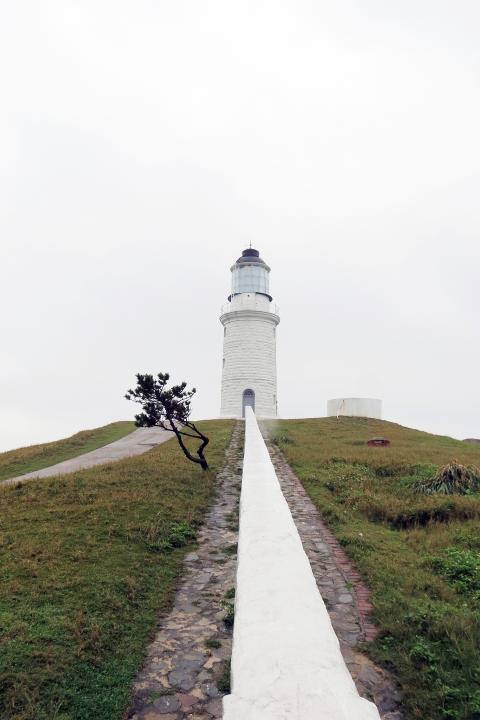The Tungchu Tao Lighthouse in Matsu is a national historic building, the first granite lighthouse built in Taiwan, which has survived the shifts of contemporary history.
The tower is located on Dongju, one of the islets of the Matsu archipelago about 25km off the coast of China.
It was constructed in 1872 during the Qing Dynasty, based on a commerce and navigation agreement signed by the Qing administration and Great Britain following China’s defeat in the Opium Wars.

Photo: CNA
The lighthouse was designated a grade two historic building by the Ministry of the Interior in 1988.
The Tungchu Tao Lighthouse is the only one built of stone that is open to visitors.
Lighthouse director Chang Wei-lun (張維倫) said that during the late Qing Dynasty, customs offices were largely staffed at senior levels by foreigners, mainly Britons.
As a result, a British company was responsible for the construction and design of the lighthouse, and a foreigner continued to serve as the director of the lighthouse until 1949, Chang said.
The most distinctive feature of the lighthouse grounds is a 30m-long windbreak wall connecting the lighthouse and an office annex.
Chang said that when oil lamps were used for illumination, lighthouse keepers would walk along the wall between the lighthouse and the office to prevent lamps from being blown out during strong winds.
Also preserved is a rainwater collection system on an upper tier of the lighthouse, which was an important source of fresh water in the remote area.
The Tungchu Tao Lighthouse, like other lighthouses around the nation, was managed by the Customs Administration under the Ministry of Finance until 2013, when it was transferred to the Maritime and Port Bureau under the Ministry of Transportation and Communications.

A preclearance service to facilitate entry for people traveling to select airports in Japan would be available from Thursday next week to Feb. 25 at Taiwan Taoyuan International Airport, Taoyuan International Airport Corp (TIAC) said on Tuesday. The service was first made available to Taiwanese travelers throughout the winter vacation of 2024 and during the Lunar New Year holiday. In addition to flights to the Japanese cities of Hakodate, Asahikawa, Akita, Sendai, Niigata, Okayama, Takamatsu, Kumamoto and Kagoshima, the service would be available to travelers to Kobe and Oita. The service can be accessed by passengers of 15 flight routes operated by

Chinese spouse and influencer Guan Guan’s (關關) residency permit has been revoked for repeatedly posting pro-China videos that threaten national security, the National Immigration Agency confirmed today. Guan Guan has said many controversial statements in her videos posted to Douyin (抖音), including “the red flag will soon be painted all over Taiwan” and “Taiwan is an inseparable part of China,” and expressing hope for expedited reunification. The agency last year received multiple reports alleging that Guan Guan had advocated for armed reunification. After verifying the reports, the agency last month issued a notice requiring her to appear and explain her actions. Guan

GIVE AND TAKE: Blood demand continues to rise each year, while fewer young donors are available due to the nation’s falling birthrate, a doctor said Blood donors can redeem points earned from donations to obtain limited edition Formosan black bear travel mugs, the Kaohsiung Blood Center said yesterday, as it announced a goal of stocking 20,000 units of blood prior to the Lunar New Year. The last month of the lunar year is National Blood Donation Month, when local centers seek to stockpile blood for use during the Lunar New Year holiday. The blood demand in southern Taiwan — including Tainan and Kaohsiung, as well as Chiayi, Pingtung, Penghu and Taitung counties — is about 2,000 units per day, the center said. The donation campaign aims to boost

The Central Weather Administration (CWA) said a magnitude 4.9 earthquake that struck off the coast of eastern Taiwan yesterday was an independent event and part of a stress-adjustment process. The earthquake occurred at 4:47pm, with its epicenter at sea about 45.4km south of Yilan County Hall at a depth of 5.9km, the CWA said. The quake's intensity, which gauges the actual effects of a temblor, was highest in several townships in Yilan and neighboring Hualien County, where it measured 4 on Taiwan's seven-tier intensity scale, the CWA said. Lin Po-yu (林柏佑), a division chief at the CWA's Seismological Center, told a news conference